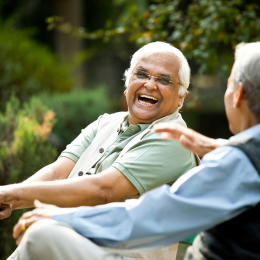Mental Health During COVID-19: How Are You Really Feeling?
If you’ve struggled with stress, anxiety, or depression during the pandemic, you’re not alone. Here’s how to cope.

For months, you’ve likely been doing everything you can to protect yourself from COVID-19. But even if you’ve stayed physically well, the pandemic is likely taking a toll on your mental health.
That’s especially true for older adults. A recent Kaiser Family Foundation poll showed that in July 2020, 47 percent of those age 65 and older said that coronavirus stress had had a negative impact on their mental health—compared with just 27 percent four months earlier. And among adults over 18 already dealing with chronic health conditions, a whopping 62 percent reported negative mental health impacts.
It’s all playing out in a lot of different ways. A big one: tossing and turning. In the Kaiser poll, 36 percent of Americans reported sleep troubles, a typical sign of anxiety. A survey in Obesity Research and Clinical Practice uncovered another sign of anxiety and depression: overeating. In fact, 40 percent of respondents reported stress eating that had led to weight gain.
Mental health alert: One in four older adults have reported experiencing depression and anxiety during the pandemic. If you’re among them, now’s the time to take action.
“With the pandemic, it’s perfectly normal to feel anxious and a bit overwhelmed,” says Michelle Riba, M.D., a professor of psychiatry and associate director of the University of Michigan Depression Center. “So it’s important to take stock of how you’re doing mentally and figure out what you could be doing to feel better.”
Here’s what to do to stay strong mentally and emotionally during the pandemic.
Take Care of Your Physical Health
“Your physical well-being and your mental well-being are intimately connected,” says Dr. Riba. Check your medications and make sure that you have the refills you need. If you’re not taking care of your medical problems, that could have a major impact on your mood.
Diabetes, for example, can make people depressed and anxious if it’s not well managed. And be sure to keep up with your regular checkups, even during the pandemic. Uneasy about visiting the doctor’s office? Try a telehealth visit by computer or telephone.
Go on a News Diet
There’s a fine line between staying well informed and getting freaked out. Too much information contributes to higher levels of stress and anxiety. Instead of following every breaking development in real time, try consuming your news in small portions. Give yourself 15 minutes a day to catch up on the latest information—and 15 minutes a day to talk about it with a friend or partner.
Put a lid on your Googling time too. One great strategy: Set an alarm on your phone. “Remind yourself you can Google information on the virus, but keep it under control,” suggests Kerrie Smedley, Ph.D., a psychotherapist in Annville, Pennsylvania. “Tell yourself you can look up the latest reports at a particular time, not whenever a thought pops into your head.”
Keep Active
Want to feel better? Move more. According to the Centers for Disease Control and Prevention (CDC), physical activity has a very positive impact on mental health. Benefits include increasing self-esteem, taming stress, and decreasing depression and anxiety.
Researchers studied the effects of exercise during the recent COVID-19 lockdown in Italy and found that the more physical activity people engaged in, the lower their stress levels and the better their mental health.
Even if you can’t get to your gym, you can still go outside for a walk, or join a virtual SilverSneakers LIVE class. Find creative ways to keep moving—and stay happy.
Make a Schedule—and Stick to It
Thankfully, COVID-19 vaccines are helping us get back on the road to normal, but it may take a while to fully bounce back physically and mentally. Your best bet?
“Make a plan,” says Dr. Riba. “Don’t just let things happen. The simple act of planning is helpful—rolling up our sleeves and figuring out how we’ll handle a challenging stretch of time can make us feel better.”
Dr. Riba suggests setting up a schedule for each day, making time to exercise, to learn something new, and to connect with others—or even to volunteer remotely.
Subscribe to our newsletter
It's quick and easy. You could be one of the 13 million people who are eligible.
Already a member? Click to discover our 15,000+ participating locations.
Follow Us
“Having a plan and a sense of purpose can decrease our anxiety and lift our mood. It increases our sense of control and gives us goals to shoot for,” Dr. Riba says.
Reach Out for Help
Be aware of the classic signs of mental health challenges. “If you’re having a low mood for a couple of weeks, that’s a flashing red light,” Dr. Riba says.
If the same worries keep looping through your brain or if you’re having trouble concentrating, are feeling hopeless or helpless, or your appetite or sleep have changed unexpectedly, it’s time for a conversation with your primary care provider.
“Everybody’s been distressed at some level throughout the pandemic,” says Dr. Riba. But if you’re having significant mood problems or if preexisting anxiety or depression is returning or worsening, talk to your doctor.
If you are having thoughts of harming yourself or need immediate help in a crisis, call 911. You can also call the National Suicide Prevention Lifeline at 1-800-273-8255. Calls are free and confidential.
And a great resource that can help you process feelings of grief, loss, or worry during the pandemic: howrightnow.org. It also includes a contact list for additional support.
“Mental illness is common, and it’s treatable,” says Dr. Riba. “You don’t need to suffer in silence.”
Check Your SilverSneakers Eligibility Instantly!
If you have a Medicare Plan, it may include SilverSneakers—at no additional cost. Check your eligibility instantly here.





